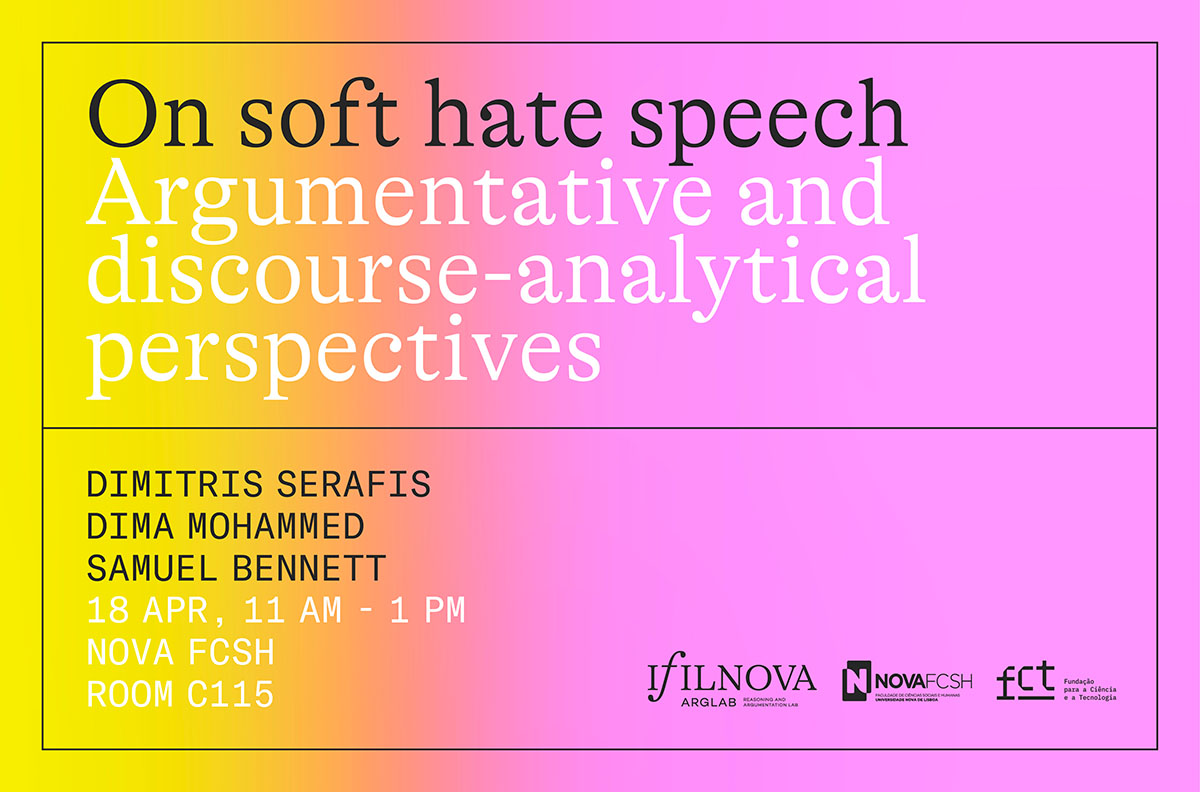On soft hate speech

The workshop “On soft hate speech. Argumentative and discourse-analytical perspectives” will take place on April 18, between 11 AM and 1 PM, at NOVA FCSH (Tower C – Room C115) and online, via Zoom. The workshop will feature the participation of Dimitris Serafis (University of Groningen), Dima Mohammed (NOVA University Lisbon) and Samuel Bennett (Adam Mickiewicz University in Poznań).
Programme
11:00–11:40 Dimitris Serafis (University of Groningen)
“Unveiling the rationale of soft hate speech”
11:40–12:20 Dima Mohammed (NOVA University Lisbon)
“There is nothing soft in “soft hate speech”: The argumentative potential of implicit discriminatory hatred”
12:20–13:00 Samuel Bennett (Adam Mickiewicz University in Poznań)
“Booing and denial of racism at Euro 2020”
Abstracts
Unveiling the rationale of soft hate speech
Dimitris Serafis, University of Groningen, Netherlands
Hate speech has attracted intense scholarly interest from multiple disciplinary perspectives (e.g. Waldron 2012; Baider et al. 2020). Although the term stems from a “legal context [and it] usually refers to violent threats or expressions of prejudice against particular groups on the basis of race, religion, or sexual orientation” (Paasch-Colberg et al. 2021: 171), when it comes to manifestations of hate speech in real-life communication, studies show that these can be subtle, passing under the legal radars (e.g. Assimakopoulos 2020). This ambiguity led Assimakopoulos et al. (2017: 4) to distinguish between “hard hate speech” namely “prosecutable forms that are prohibited by law” and “soft hate speech”, which includes cases that are “lawful but raise […] serious concerns in terms of intolerance and discrimination”. Based on this distinction, recent studies claim that research on soft hate speech should zoom in on the “argumentativity” (Amossy 2009; Reisigl & Wodak 2016) of discriminatory discourses; specifically, analysis in that respect should identify and the argument schemes (loci) on the basis of which standpoint-argument couplings are inferentially developed, ending up justifying hatred attitudes in society (Serafis & Assimakopoulos 2023; Serafis & Boukala 2023; Serafis et al. 2023). To do so, an argumentative perspective, with a particular focus on “inference in argumentation” (Pinto 2001; Rigotti & Greco 2019), appears to be necessary for scholars to delve into and unveil the “underlying rationale of soft hate speech” (Serafis 2022).
*
There is nothing soft in “soft hate speech”: The argumentative potential of implicit discriminatory hatred
Dima Mohammed, NOVA University Lisbon, Portugal
In this talk, I explore the hateful discrimination involved in public messages in which a Portuguese politician alleges wrongdoings by members of the Roma community. The messages, which brought the hate speech charge on the politician but didn’t get him convicted, are analysed as cases of soft hate speech (Assimakopoulos et al., 2017): while they do not necessarily explicitly state that somebody is to be hated, they crucially provide the underlying rationale in support of discriminatory hatred. In order to uncover this underlying rationale, I adopt an argumentative perspective: I discuss the premises that are communicated in the messages and reconstruct the overall argument that links them. In doing that I pay special attention to the inferences invited by the structure of the messages and the argumentative potential (Mohammed, 2019; see also Kjeldsen, 2017; Serafis, 2022) that the premises have. The analysis reveals an implicit meaning that is not just discriminatory, but also inciteful to actions that could be violent against the Roma community. Consequently, it explains what makes soft hate speech perilous: while the messages are not necessarily legally culpable, they are nevertheless discursively responsible for inciting hatred, discrimination, and -maybe- violence against the already disprivileged minority group.
*
Booing and denial of racism at Euro 2020
Samuel Bennett, Adam Mickiewicz University in Poznań, Poland
During the Euro 2020 men’s football championships the England team took the knee prior to kick-off as a protest against racism, to which some England fans reacted by booing. The taking of a knee in other sporting contexts has been met by considerable opprobrium from right-wing politicians and been weaponised as part of a reactionary ‘culture war’ against calls for action to address systemic racial discrimination. This paper offers an analysis of Conservative politicians’ responses to the England players’ actions and to the subsequent negative reactions of fans. First, I explain how attempts to deny and define racism are manifestations of covert racism. I then conceptualise booing as a strategy of denial of racism. The analysis reveals three main discursive strategies: (1) delegitimising the players’ protests by linking it to Black Lives Matter; (2) agreeing with the goals of the protests but not the means; and (3) calculated ambivalence towards those who booed. I then show how this allowing of covert/soft speech was juxtaposed to a condemnation of explicit/hard hate speech. I conclude, firstly, that this relies on a thin understanding of racism as a discursive repertoire rather than as a system of power, and secondly, that the ambivalence towards the booing acted as a gateway for it.
This event is organised by Dima Mohammed and Maria Grazia Rossi. To join the session on Zoom, please get in touch with Maria Grazia Rossi at mgrazia.rossi@fcsh.unl.pt for the details.
Event supported by the Foundation for Science and Technology (Fundação para a Ciência e para a Tecnologia) of the Portuguese Ministry of Education and Science under the project UIDB/00183/2020.

